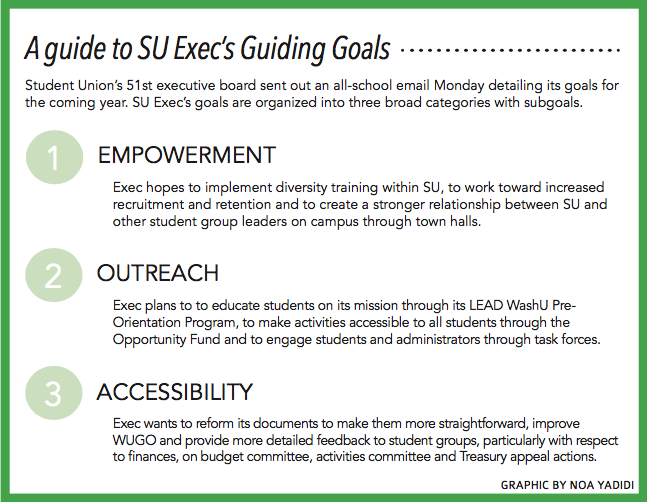News | Student Union
51st SU Exec looks to improve accessibility, communication
The 51st Student Union executive board outlined their goals for the upcoming year—organizing them according to the guiding principles of empowerment, outreach and accessibility—in an all-school email sent out Monday.
The document introduced each member of the executive board and outlined a number of sub-goals, including implementing diversity training within SU and hosting town hall-style meetings for student groups every other month.

While the exec members unveiled some new goals, they plan to revise and improve upon existing programs. The report is intended to be a “living document,” which means the board will continue to amend the document as their term progresses.
“New goals will be added in when we see fit and where we see fit,” sophomore and Vice President of Administration Tess Mandoli said. “As things come up, we will have new issues to tackle, and…we definitely want to add them to this goals document, because having something like this holds us accountable to the things we want to accomplish.”
The theme of improving communication with student groups, which is found throughout the document, can be seen most notably in one of the proposed new programs: town hall meetings.
“Currently, there are [SU] Senate meetings that are open to the public, but those usually aren’t super well-attended because not many people like to go to Simon [Hall] at 9:30 p.m. on a Tuesday,” sophomore and Vice President of Public Relations Bilal Hyder said. “Lots of things are discussed in Senate, and students should be able to ask questions—it’s just that it’s not really something that students feel is worth it to attend. It’s much easier for someone to ask a question when they’re surrounded by their peers versus sitting in a room of senators asking a question to a senator.”
The exec board also hopes these town halls will be attended by SU liaisons, who will be newly designated members of student groups responsible for communicating with SU.
“I think that a great opportunity [to introduce the idea of an SU liaison] will be during presidents’ and treasurers’ training, when we will be able to speak directly to the presidents and treasurers about appointing an SU liaison within their group,” Mandoli said. “Once we get that going, we’ll schedule our town hall meetings.”
Another priority of the new exec board is to update Washington University Group Organizer (WUGO), a directory that gives each student group on campus a page with a number of administrative functions.
“The biggest thing with WUGO is that there’s a calendar on it, and I don’t understand it or how it works, which is not good,” sophomore and Vice President of Programming Kyle Jeter said. “It’s very much not utilized to its full potential…and that’s a problem, so I’d like to fix that.”
In addition to these goals, Mandoli noted that the exec board plans to act swiftly to address the governing body’s diversity issues.
“For me, my biggest priority is to make SU a more inclusive and diverse space,” Mandoli said. “I was really bothered by the [Diversity Affairs Council] report on diversity that was released last semester that showed how non-diverse we are—and bothered in a way that’s going to make me more productive right away.”
According to junior and Vice President of Finance Iliana Ragnone, the document encompasses each of the members’ individual goals and will enable the board to work together as a cohesive unit.
“Something that got me the most excited about this upcoming term was how when we sat down to write this document and build it from the ground up, all of our individual goals could kind of fit under these larger categories, so I think it’s kind of inspiring to see how we can all collaborate and work together,” she said.
